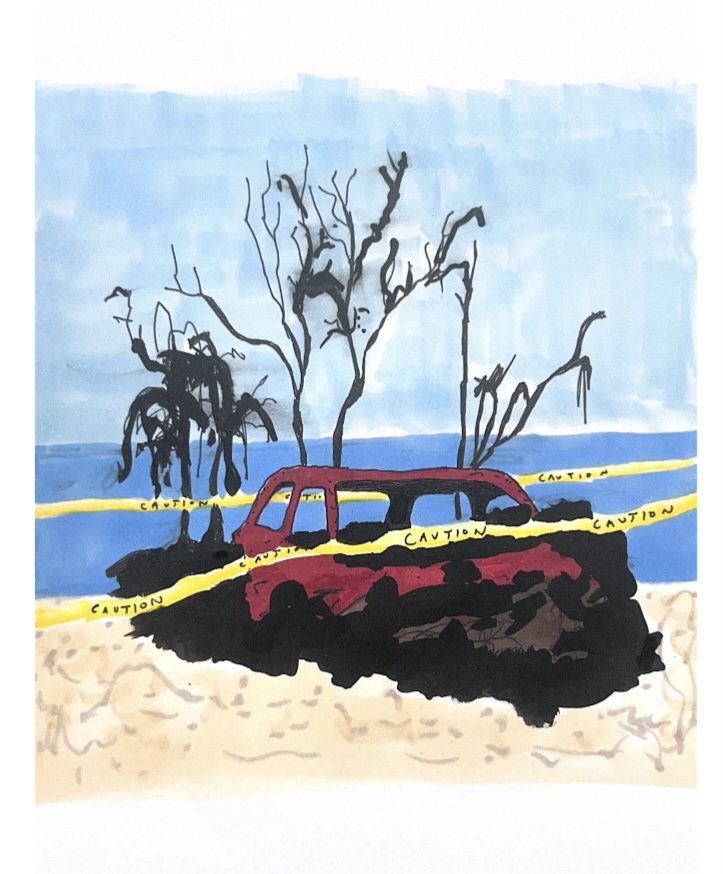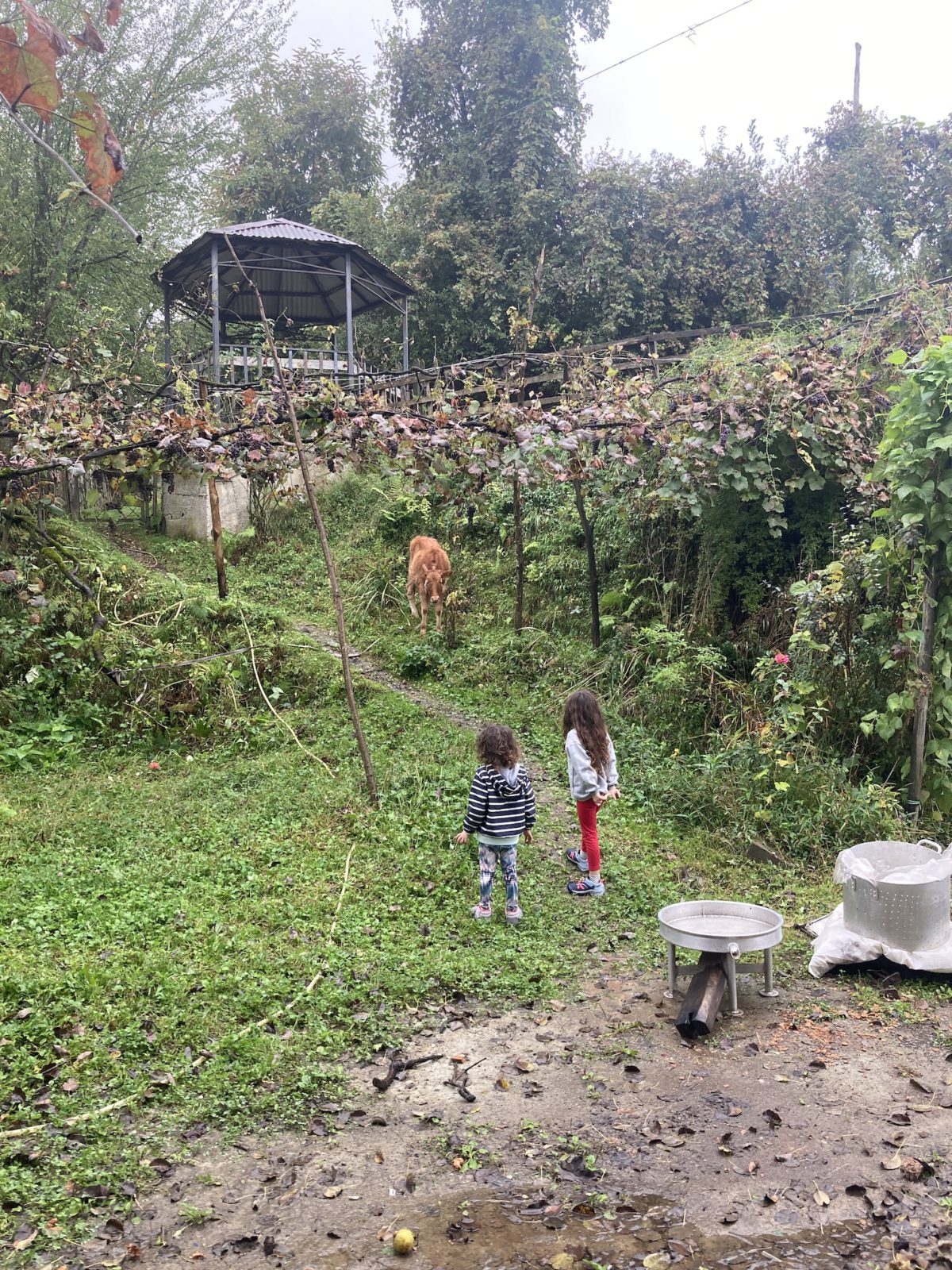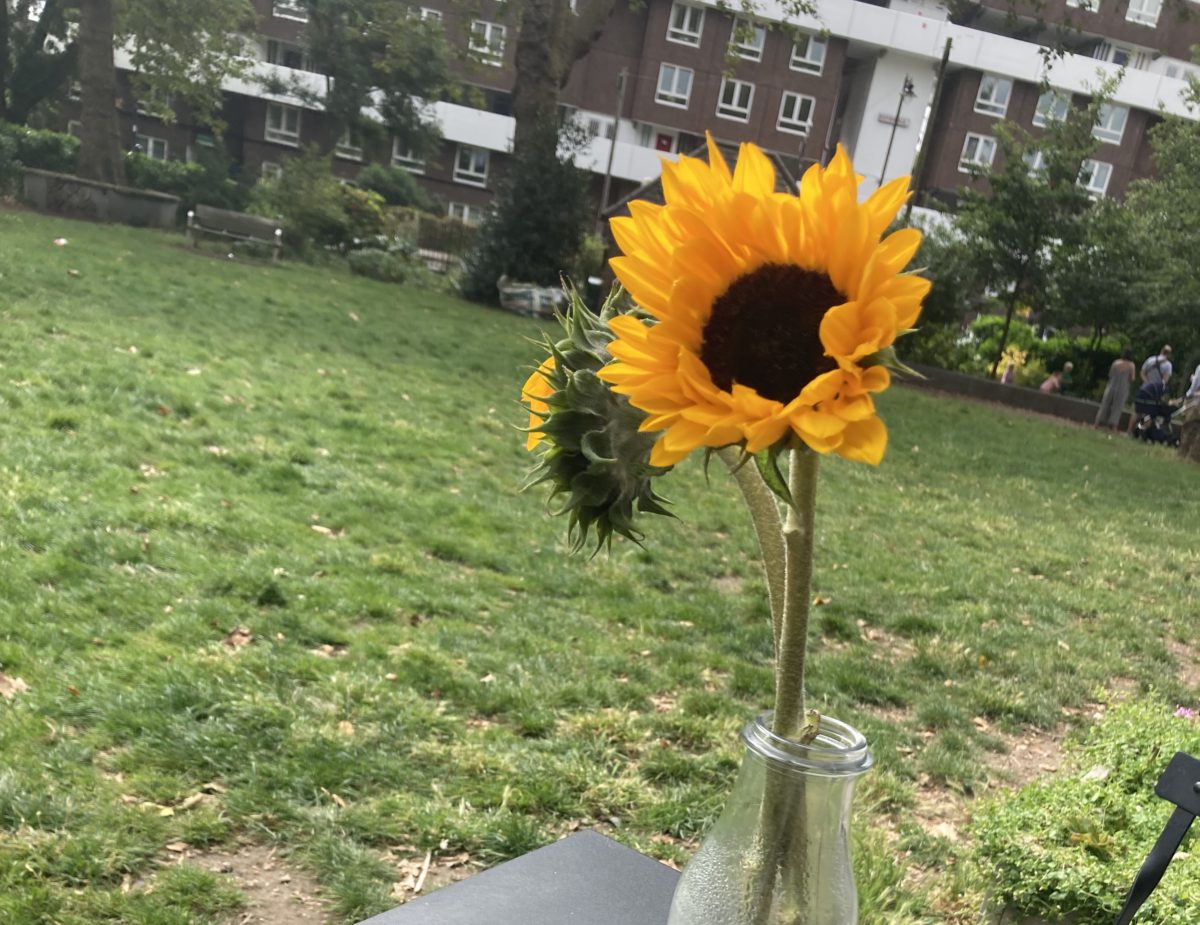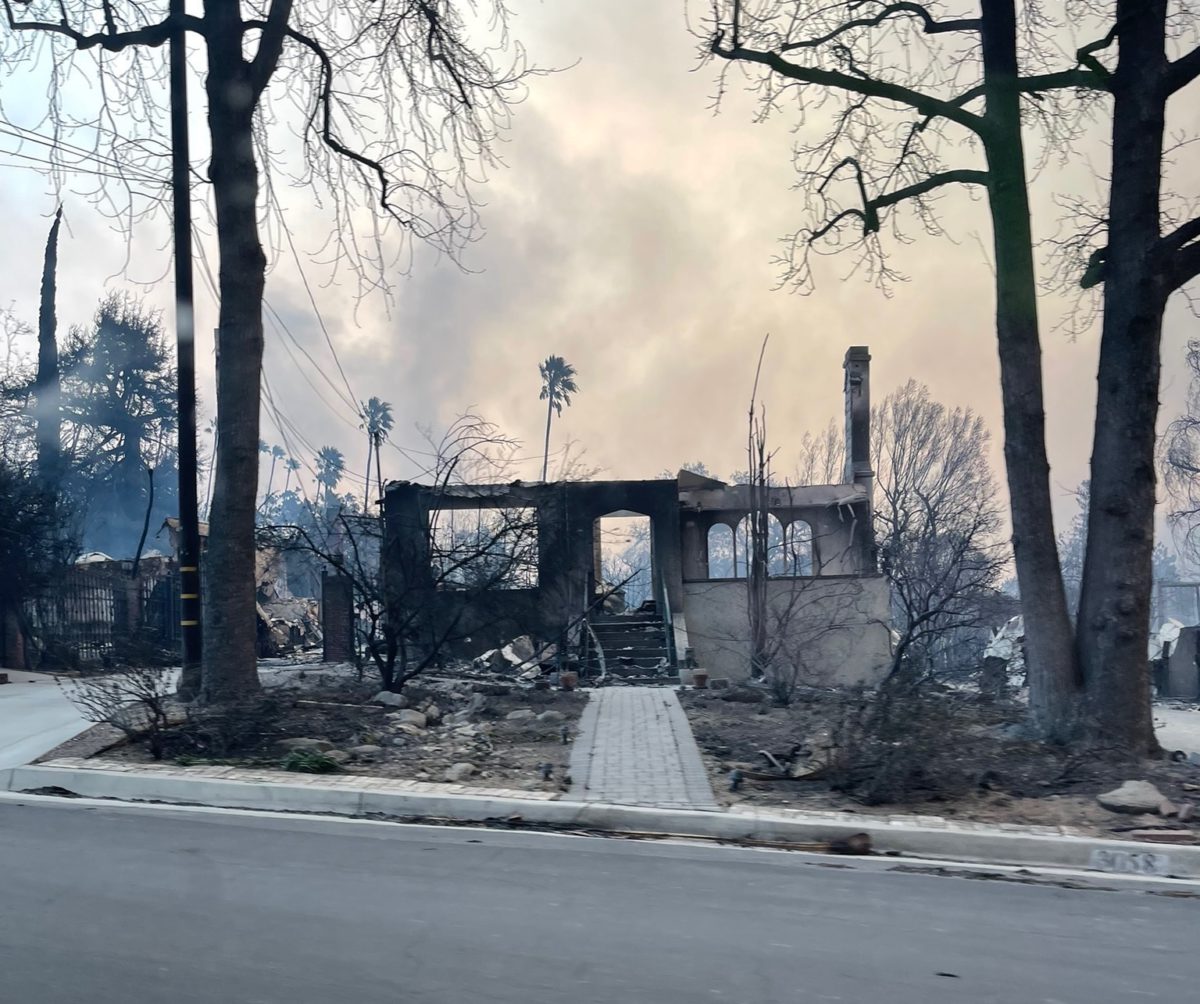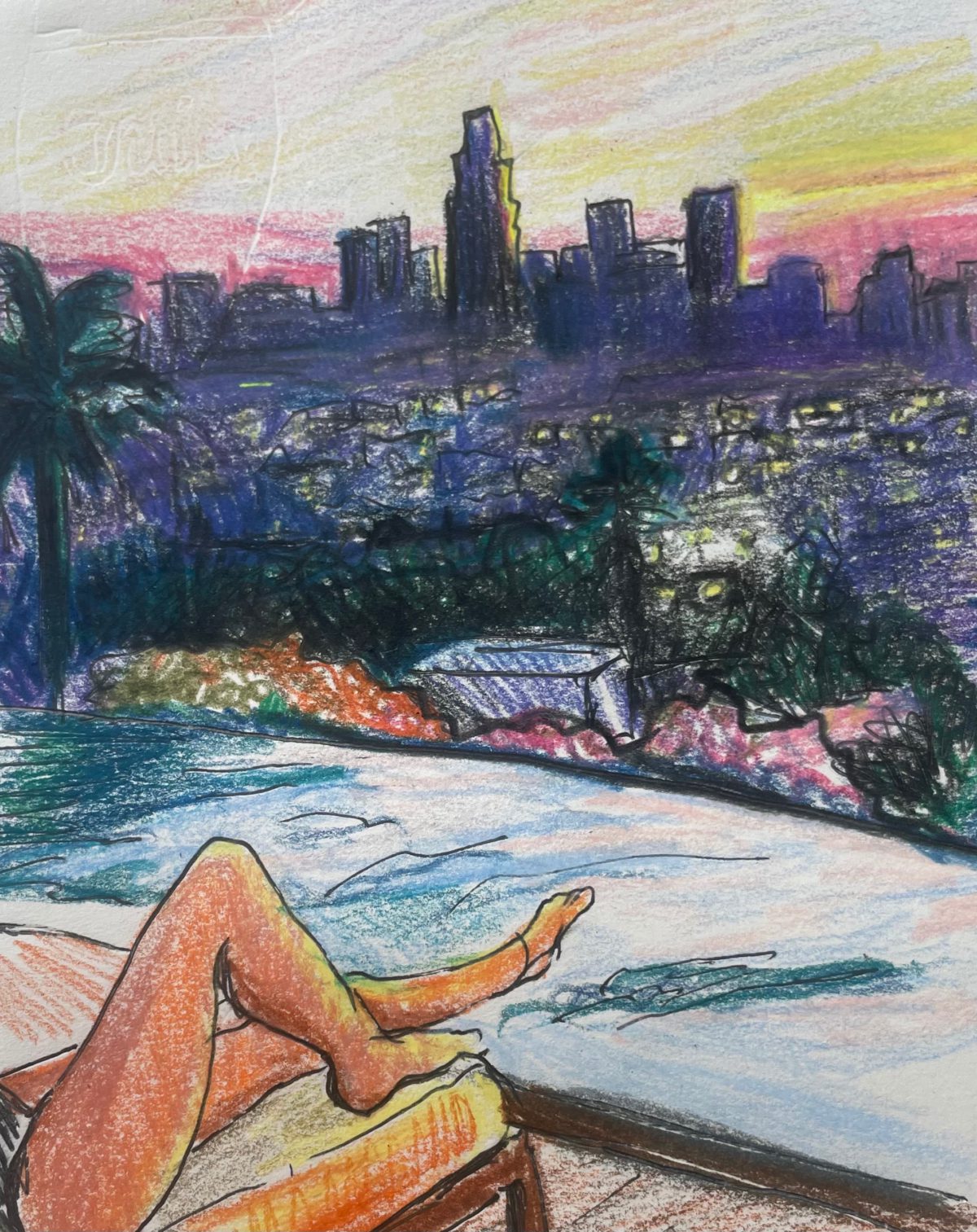
Los Angeles is ugly. I tend to forget. I fly back from Texas and when the airplane lands, I am surprised again by the low-hanging smog and the unending strip malls. Miles and miles of pavement. “Not a pretty place to live,” I mutter, easing my rental car down a wide, choked freeway. Every time, I expect shimmering beaches, clear skies, and open roads but this place always disappoints. Everything is gray. The whole city is sharp angles and taillights. The Hollywood sign is smaller than it seems on TV. It’s always far away, like a vanishing point. I tell people that going back to California depresses me. This time especially, as I’m here for my grandfather’s funeral.
Still, for a night, I linger in the city and play at glamor. I meet up with an old friend and we slip through the VIP entrance of a club in the hills of West Hollywood. That’s the thing about California: you’re always one fake name away from the life of your dreams. We drink vodka martinis on a rooftop terrace with a pool, pretending we are not who we are, but characters on a television screen.
In 2003, the year I turned thirteen in Northern California, The O.C. hit network television. Those rich and beautiful teenagers moved through the golden glow of Southern California. They hooked up with each other, drank vodka from the bottle, and drove Range Rovers. Buffered by wealth, they functioned with the autonomy of adults. For all the soap opera drama in their lives, it seemed aspirational.
I must have had The O.C. in mind—the casual loveliness of Marissa Cooper and Summer Roberts—when my high school best friend Bella and I laid out in bikinis, shivering in cool spring sunshine. We were Northern California girls, from the green hills above San Francisco, and I was longing for an adulthood that seemed synonymous with faraway Southern California.
The beaches of Northern California are rocky and cold, so we positioned our lounge chairs next to her dad’s pool. Sunlight fell patchy through the densely foliaged oak trees but it hardly mattered. I wouldn’t have known what to do with a tan if I had managed to get one. My body was alien to me still. Tan skin as an end goal was vague and meaningless. All of it arbitrary. The point was not being tan, but being the kind of woman who tanned. I was performing “California girl” as I understood it then.
When strangers ask where I’m from, I lie. Instead of saying California, I pretend to disown all of it. My grandfather arrived in the Bay Area from Massachusetts, on a merit scholarship to Stanford, at a time when California gleamed like a beacon to the country’s best and brightest. The year was 1947, right smack in the middle of Hollywood’s Golden Era. California must have seemed bountiful then. Nothing ended, nothing died.
Now, there is never enough. Not enough jobs in the Central Valley. Not enough housing in the Bay Area. Not enough water in the Los Angeles Basin. People stream out of the state, manifest destiny reversed. I am just one more expatriate watching California on a screen. My embarrassing secret is I’ve never stopped thinking of those depictions as a map back home to a moment when the future seemed uncomplicatedly good.
Recently, in the humid summers of Austin, Texas, I had been watching The O.C. on repeat. When I watched the show, my life back in California seemed more saturated in my mind. I remembered myself as narratively important, like I, too, was once a main character. My childhood memories dimmed against the vividness of the screen. More than homesick, I became nostalgic: Crab and brie phyllo on a catering tray. Hot hiss of a straightening iron. Flask sloshing inside a quilted Chanel purse. Creamy orange sunsets over an infinity pool.
I taught myself how to curl my hair at 15 using a photo spread in YM magazine. Mischa Barton was the model, culturally relevant as a star of The O.C., her blonde hair in thick ringlets. The magazine called it an easy hairstyle, “style and go in less than ten minutes,” perfect for Monday mornings before class. At 6 am, I worked the wide-barreled curling iron awkwardly, burning the edges of my face. My curls always limp before the first-period bell.
The summer before junior year, Bella and I threw a pool party in her backyard. We invited boys with floppy, full hair who came and kicked a soccer ball around on the wide lawn. We lounged in our American Eagle bikinis and Rainbow flip-flops. There was no alcohol in our world yet, just warm Pepsi and Starbucks lattes. I shuffled mix CDs labeled with Sharpie, curating the music of our high-school experience as if to remake it in the image of what I had seen on screen. Death Cab for Cutie. Phantom Planet. Spoon. I burned with a sense of arrival. The aspiration of my adolescence stretched toward belonging, safety, and possibility that my adult nostalgia still reaches back for today.
When I watched the show, my life back in California seemed more saturated in my mind. I remembered myself as narratively important, like I, too, was once a main character.
When The O.C. first came on the air, YouTube didn’t exist and Google was only six years old. San Francisco was still funky, Northern California was out, and frothy Southern California was the cultural center of the world. Lindsay Lohan and Paris Hilton bought low-rise jeans and baby tees at Kitson. Artifacts I will associate with womanhood forever—strapless dresses, pastels, and stiletto heels—were the popular styles. The economy was expanding. The housing market had not yet crashed. The whole world was awash in body glitter and I was a young teen playing at adulthood for the first time. It might have been the last moment in history when it was possible to believe earnestly in the upward mobility of the American dream.
Over four seasons, The O.C. follows teenager Ryan Atwood as he moves from the “slums” of Chino to the gated communities of Orange County. The dividends for moral goodness are paid in Range Rovers and Juicy tracksuits, a distinctly Californian fable. In the world of the show, there is always — with the right combination of luck and hard work — the opportunity to become someone completely new. If this is the American ethos, it somehow feels even more true in the land of the Gold Rush and the Tech Boom. The newest of the new money where millionaires are made overnight. A land of equal opportunity.
Whenever I am back in California, I can almost remember what it felt like to believe that.
I was living in Washington when the October 2017 Northern California Fire Storm arrived. The Tubbs Fire. The Atlas Fire. The Nuns Fire. A convergence of flame that sprawled, uncontained, for 23 days. The dry foothills burned hot and fast. Fires ripped through residential neighborhoods in the night, killing entire families as they slept. One woman survived by climbing into her swimming pool.
In the following days, cars lined up at the gas pumps like a movie rendering of the apocalypse and not the apocalypse itself. My mom and her husband fled, driving past walls of flame in their Prius. When she called me, we wondered how my grandfather could be evacuated if needed; he was frail and already disoriented even within the familiar walls of his home. My high school boyfriend, captain of the baseball team back when our lives felt like a teen drama, drove by my mom’s every morning to check on it.
Improbably, my childhood home was still standing. With so many of the oak trees destroyed, the valley looked unfamiliar. My hometown gone up in wildfire smoke.
There’s something alchemic about telling yourself a story so many times it becomes more real than what is.
Joan Didion, in her 2003 book Where I Was From, grapples with the myth of California. From New York, she interrogates her memories against the realities of the state.
A Sacramento native, Didion describes California with a reverence that only seems possible from a distance. She describes “yearning for California” from the Vogue office in New York, and “writing the novel that would put such a protective distance between me and the place I came from,” as if the California of her first book, Run River, would necessarily come to supersede the California of her reality.
Even as she wrote to deconstruct the myth of California, Didion affirmed it. Though she confessed to homesickness, she did not write generously about the state while she lived there. Slouching Toward Bethlehem rails against the false promise of the Haight-Ashbury hippies. The White Album is as tense as Didion herself, bristling with the violence of the Manson murders and the taut politics of the 1970s. The texture of her unsettled mind and the texture of California blur. This, too, is a false place.
There’s something alchemic about telling yourself a story so many times it becomes more real than what is.
In Los Angeles, I say goodbye to my friend and drive east toward the desert. Somewhere along the road, I stop for tacos. There’s a television in the restaurant and the man next to me at the counter wants to talk about the football game. The Dallas Cowboys are playing.
“That’s my team,” I tell him, though I have no interest in sports. It’s this new identity as a Texan that thrills me, as if my cowboy boots give me a new perspective on the world.
Tomorrow, my mother and I will scatter my grandfather’s ashes in a private and unfamous part of the state. A place I have never seen on screen. But tonight, driving through the desert east of Los Angeles, it is as if I’m cosplaying California.
I had forgotten the cotton candy colors of the sun setting over the ocean. The briny smell of the air. Gas almost six dollars a gallon. These experiences are novelties to me now. I am a tourist in my home state, free to enter the myth of California itself.
With the windows down, I play the theme song from The O.C., with its wailing repetition of “California, here we come.” An invocation. I play it on loop until it becomes the soundtrack. My California flicks past like a movie montage. This California is not on fire, this California is always golden.
Here we come.

